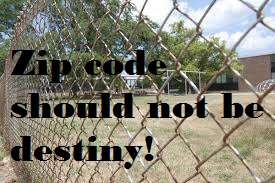Creaming is the act of taking the best applicants for your school, creating a charter school which succeeds because troublesome and/or academically deficient students are not accepted into the charter school. Students who might have held down test scores get sent elsewhere, often to the local public school down the road. Public schools never have an option to cream.
As we continue the charter school debate, I thought I’d throw this comment by a charter school administrator into the mix. This woman passionately believes in saving all the children who come in her door. I give her credit for those views. Other charter administrators can be less welcoming.
In this time of data-rules-all, though, I think we have to be aware of creaming. It’s too easy for charter advocates to point to local charter schools to say, “See? The scores at XYZ Charter are significantly better than the scores at Local Public School. This proves charters are the way to go.”
I am not against charters. I favor choice, for one thing, and if a parent’s only choice is a public school performing in the bottom 2% of state schools, then that parent ought to have an alternative. Zip code should not be destiny.
But I do think that we need to get the issue of creaming up and front for examination. If XYZ Charter does not accept Napoleon because of his behavioral issues or Tom because of his academic deficiencies, then the school gains a sometimes formidable advantage in the annual test score game. For one thing, Napoleon and Tom end up at the local public school. If Napoleon is especially behaviorally challenged, he may disrupt learning for all of his classes, at least until the paperwork for special education placement goes through. That paperwork can take years, depending on the district and the degree of disruption Napoleon creates, though.
Creaming skews local school populations, putting the more problematic students in local public schools while charters duck trouble by passing problems on. I am not blaming the charters. I think our Napoleons are an under-addressed issue in education and I understand why a charter would choose to minimize classroom disruptions.
Charters have another advantage that needs to be on the table. How does a student get into a charter school? A motivated parent puts in the time and effort to apply to the school. They may volunteer to work charity and fund-raising events as part of the process.
Motivated parents are the strongest force I know for educational excellence. Those kids who started to slide academically in middle school? I could mostly predict how that slide would go by looking at their parent(s). When parents started calling, emailing, and turning up to check on homework, taking away phones in response to bad grades, and signing daily homework logs, the odds were good that a kid would pull it together. In the absence of parental participation, though, those slides can become avalanches that no educator can stop.
(To any parents out there who tried and failed, I’d like to say that parents can only do so much. Some adolescent crises cannot be solved by emails and homework logs. I should add not to give up hope. That boy who flunks his way through high school may still get a graduate degree or two, especially after a few years working in the hot sun. I’ve seen it happen.)
Eduhonesty: Some of our local schools are performing so poorly that I can only advocate for alternative schools, currently filled by America’s charters and other private schools. That said, I want to emphasize that using test scores for comparisons between local public and charter schools will not tell the whole story. The public school has to accept everyone who lives in district. Charters have more discretion. Some charters do cream. Any comparisons between local public and charter schools will be unfairly biased when creaming occurs. Who the administration lets into school hugely impacts eventual academic results.
Are those creaming charters better schools? In the sense that students appear to be learning more, they may be the better choice. If I lived in some zip codes, I’d pick that selective charter school for my kids before I’d let my daughter spend a year worrying that Napoleon might cut her or slice off her hair with the scissors he keeps carrying around.*
In the end, I’d get my child into the best school available. That school may be a charter. Or it may be the local public school. If I were a parent, I’d research local options on the internet. Then I’d walk into the schools. I’d see if administrators would let me observe areas of the school. I’d watch the kids. I’d look at the work on the walls. I’d try to find out about the teachers at my child’s grade level. For any parents who have a choice, this research has the potential to affect the rest of your child’s life.
*True story. The boy ended up in an alternative school placement midway through the year, but not before he had sliced a few computer cords and kept a whole classroom of second graders on regular red-alert through the fall and part of the winter. For the first-year teacher who was managing this classroom, that boy was a true trial by fire.

